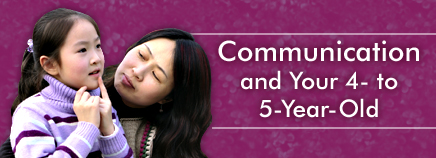
Communicating with our kids is one of the most pleasurable and rewarding parts of parenting. Children learn by absorbing information through daily interactions and experiences not only with us, but with other adults, family members, other kids, and the world.
And between the ages of 4 and 5, many kids enter preschool or kindergarten programs, with language skills a key part of learning in the classroom.
Communicating With Your Child
The more interactive conversation and play kids are involved in, the more they learn. Reading books, singing, playing word games, and simply talking to kids will increase their vocabulary while providing increased opportunities to develop listening skills.
Here some ways you can help boost your child’s communication skills:
- Talk about the day’s activities.
- Talk with your child about the books you read together.
- Talk with your child about the TV programs and videos you watch together.
- Keep books, magazines, and other reading material where kids can reach them without help.
- Help kids create their own “This Is Me” or “This Is Our Family” album with photographs or mementos.
Vocabulary and Communication Patterns
As kids gain master language skills, they also develop their conversational abilities. Kids 4 to 5 years old can follow more complex directions and enthusiastically talk about things they do. They can make up stories, listen attentively to stories, and retell stories.
At this age, kids usually can understand that letters and numbers are symbols of real things and ideas, and that they can be used to tell stories and offer information. Most will know the names and gender of family members and other personal information. They often play with words and make up silly words and stories.
Their sentence structures may now include five or more words, and their vocabulary is between 1,000 and 2,000 words. Speech at this age should be completely understandable, although there may be some developmental sound errors and stuttering, particularly among boys.
If You Suspect a Problem
If you suspect your child has a problem with hearing, language skills, or speech clarity, talk to your doctor. A hearing test may be one of the first steps to determine if your child has a hearing problem.
If a specific communication deficit or delay is suspected, the doctor may recommend a speech-language evaluation. A child who also appears to be delayed in other areas of development may be referred to a developmental pediatrician or psychologist.
Typical Communication Problems
Communication problems among kids in this age group include:
- hearing difficulties
- problems following directions
- trouble asking or answering questions
- difficulty holding a conversation
- poor vocabulary acquisition
- difficulty learning preschool concepts, such as colors and counting
- stuttering
- difficulties putting sentences together
- unclear speech
Some kids will outgrow these problems. For others, speech therapy or further evaluation might be needed. Your doctor will help determine whether your child would benefit from speech and language evaluation and treatment.

